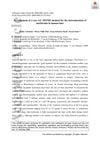 30 citations,
June 2014 in “Seminars in Immunology”
30 citations,
June 2014 in “Seminars in Immunology” Future research on ectodysplasin should explore its role in diseases, stem cells, and evolution, and continue developing treatments for genetic disorders like hypohidrotic ectodermal dysplasia.
 24 citations,
May 2019 in “PLOS genetics”
24 citations,
May 2019 in “PLOS genetics” Mutations in the HEPHL1 gene cause abnormal hair and cognitive issues.
[object Object]  14 citations,
June 2020 in “Drug Testing and Analysis”
14 citations,
June 2020 in “Drug Testing and Analysis” A new method was created to measure metformin in hair, showing potential for monitoring treatment and medical investigations.
 14 citations,
January 2012 in “Proteins”
14 citations,
January 2012 in “Proteins” Electrostatic interactions mainly stabilize the binding of peptides to hair keratin.
 1 citations,
December 2018 in “IntechOpen eBooks”
1 citations,
December 2018 in “IntechOpen eBooks” Human hair shows promise for non-invasive medical testing, but more research is needed to standardize its use.
 3 citations,
January 2021 in “Hair transplant forum international”
3 citations,
January 2021 in “Hair transplant forum international” The Hair Diameter Index (HDI) was created to help plan hair restoration surgery after finding that visual hair density is linked to hair count and thickness, not volume.
October 2021 in “Gender & history” Baldness challenged men's self-image and masculinity in Britain from the late 19th to early 20th centuries, leading to a market for hair loss treatments.
9 citations,
March 2019 in “Molecular & cellular proteomics” Reductive stress messes up collagen balance and alters cell signaling in human skin cells, which could help treat certain skin diseases.
[object Object] 
Different androgen concentrations affect wool-related gene expression differently in Hetian and Karakul sheep breeds.
73 citations,
October 2013 in “International Journal of Cosmetic Science” Chemical hair straightening can damage hair and health, needing safer alternatives and stricter regulations.
53 citations,
July 2016 in “Cosmetics” Future hair cosmetics will be safer and more effective.
 13 citations,
April 2018 in “Scientific Reports”
13 citations,
April 2018 in “Scientific Reports” The genes KRT25 and SP6 affect curly hair in horses, with KRT25 also causing hair loss. If both genes are mutated, the horse gets curly hair and hair loss. KRT25 can hide the effect of SP6.
3 citations,
July 2023 in “Biomolecules” B2m-free HLA variants may be a new class of HLA important in immune responses and diseases.
 2 citations,
August 2022 in “The journal of investigative dermatology/Journal of investigative dermatology”
2 citations,
August 2022 in “The journal of investigative dermatology/Journal of investigative dermatology” A specific mutation in the K25 gene causes a rare genetic disorder with curly hair at birth and later hair loss, along with dental issues.









